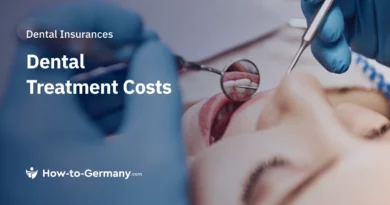How we earn our money
We finance our services on how-to-germany.com through affiliate programs.
When a user orders a financial product through our site and their application is approved, we may receive a commission from some providers. It’s important to note that this does not in any way influence our independent ratings and recommendations.
All the products we present on how-to-germany.com are selected for their quality, range of services, and excellent value for money.
Dental Insurance (Zahnzusatzversicherung) in Germany
- You can afford beautiful, healthy teeth without financial burdens.
- Insurance coverage of dental care, dentures, and orthodontic treatment in accordance with current medical standards. You can take advantage of all the benefits of private insurance, which are not covered by public health insurance.
- Even for expensive dentures and cost-intensive dental treatments, you only must pay a small deductible.
- Benefits of supplementary private insurance vary depending on the selected tariff. Full dental coverage is possible.
- Many tariffs are available without waiting times.
- Supplementary dental insurance is available for all German residents.
- You can take out supplementary dental insurance at a very low cost. Some comprehensive policies cost less than €10 per month.
- The providers Ottonova, Feather, and Getsafe specialize in insuring expats and offer the the best dental insurance in Germany.



What dental care does public health insurance cover?
Statutory health insurance in Germany works according to the principle of solidarity. All insured individuals receive the same standard benefits (Regelversorgung).
Insured individuals must pay the costs of dental treatments that do not meet the requirements of standard care. For dentures (dental implants, bridges, dental prostheses), the personal contribution is particularly high due to very tight assumption limits of the insurance fund.
Dental costs and dentures — benefits provided by public health insurance
People with public insurance have the same entitlement to insurance benefits for treatment and dentures. Certain dental services are not reimbursable.
In the case of treatment, 100% of dental costs are covered if it is medically necessary and an approved insurance benefit. For dentures, the subsidy from the insurance fund is (depending on the proof of regular check-ups):
- 60% without bonus booklet
- 70% if patients have kept a bonus booklet for five years, have their teeth checked once a year by a dentist and have the examination certified by a stamp
- 75% if the annual dental checkups can be documented in the bonus booklet without gaps for ten years.
Additional financial support is only possible through private supplementary dental insurance.
The benchmark for dental coverage is the standard benefit
These allowances for dental prostheses and other dentures seem sufficient or even comfortable. However, the standard benefit is the benchmark for the subsidy. Legislation defines the standard benefits provided as sufficient, appropriate, and economical care. No provision is made for extras.
To put it clearly: Public insurance only covers the cheapest option for dentures. The same applies to dental crowns or dental fillings — funded are only basic fillings, high-quality fillings must be paid for privately.
Qualitative, functional, and aesthetic compromises in dental services
This policy regarding dental treatment cost also means that patients without additional insurance must make qualitative, functional, and aesthetic compromises or pay high additional costs.
In practice, standard care looks like this, for example:
- Depending on the bonus booklet status, the insurance provider covers 60 to 75% of the costs for a bridge made of a simple metal alloy, which costs around €800 without a subsidy. The insurance subsidy for this is €460. However, high-quality ceramic bridges, which are now standard at dentists, cost around €1,500.
- The same applies to a ceramic crown, which costs between €700 and €1,500. Statutory health insurance only covers 60 to 75% of these costs.
- If the insured person opts for an implant instead, the insurance fund would pay the same amount as for a simple bridge — i.e., €460. However, the cost of the implant is around €3,000. Without additional dental insurance, the insured person’s own contribution would, therefore, be €2,540. If he had taken out supplemental dental insurance that covers 90% of the implant costs, he would only have to pay a co-payment of €300. Particularly problematic: dental implants would also be medically the better solution, as it protects the tooth structure of neighboring teeth.
- Larger bridges to replace missing teeth or veneering crowns outside the frontal area are also not part of the standard treatment.
- Costs for root canal treatments are covered if the tooth in question is “worth preserving” or the treatment helps to retain an intact denture. Otherwise, patients must either accept that tooth extraction or pay for the root canal treatment themselves, what can cost more than €1,000.
Status of statutory dental services
- Reimbursement of dental costs only based on standard benefits, no reimbursement for higher quality treatment
- Often high co-payment, especially for dentures
- Professional teeth cleaning only reimbursable if medically indicated
- Exclusion of certain services such as crown veneers in the lateral area or teeth whitening (bleaching).
What dental care does private health insurance in Germany cover?
Freelancers, the self-employed and employees with an income above the compulsory insurance threshold can take out private health insurance. The so-called compulsory insurance limit is currently (2024) an income of €69,300 per year or €5,775 per month.
The benefits of the private policies are agreed individually within the framework of the tariffs offered by the insurance companies. All benefits included in the insurance contract are reimbursed.
Dental care in private health insurance
Private policies pay additional costs of advanced dental treatments, preventive checkups, dentures, and orthodontic treatment. Depending on the tariff, a deductible can be agreed per year for dental services as well as for oral health services in other areas, and there are also — often significantly more expensive — policies with 100 percent comprehensive dental coverage.
Private health insurance covers the following dental health services:
Preventative treatments
- Professional teeth cleaning
- Sealing of dental fissures
- Instructions from the dentist on preventive dental care
Tooth preservation
- Caries treatment/filling with modern materials that meet the current standard of dentistry
- Root canal treatment and additional services for precise diagnostics and therapy
Dentures
Comprehensive insurance coverage of costs of dentures in accordance with modern standards:
- Dental crowns and inlay fillings
- Bridges, dental implants, dental prostheses
Orthodontic treatment
Private health insurance usually only reimburses orthodontic treatment up to a certain age limit, often up to 21 years. For adults, on the other hand, reimbursement is only possible after accidents or serious illnesses.
Purely aesthetic services such as teeth whitening (bleaching) are also partially reimbursed.
For dental treatment, your dentist will provide you with a list of all treatment steps and costs. The insurance company must confirm the costs before treatment begins so that there are no problems with reimbursement later on.
Differences in benefits between statutory and private insurers
Privately insured individuals can take advantage of more extensive and higher quality services when visiting the dentist than those covered by public insurance. There are exceptions for basic tariffs, which are based on the scope of benefits provided by the public system. Private insurance covers the treatment costs according to current medical standards minus a contractually agreed deductible.
Treatment costs for privately insured individuals are billed individually according to the scale of fees for dentists.
What dental care does supplemental dental insurance cover?
Supplemental dental insurance is a private insurance that makes sense if you have public insurance and would like high-quality dental services for the protection and treatment of your teeth without incurring a heavy financial burden.
The insurance coverage includes all services provided by dentists and orthodontists that you can also make use of with private comprehensive health insurance. Good tariffs give you reliable comprehensive dental coverage.
However, you will only be reimbursed for dental care that is explicitly covered by the policy. For example: If your tariff does not cover professional teeth cleaning, you will have to bear the costs yourself.
How does supplemental dental insurance work?
If you have taken out a private policy, the insurance will cover your dental costs to the extent agreed in the contract. High-quality insurance policies cover between 80% and 95% of treatment costs, depending on the tariff.
If you use the benefits of your additional private dental insurance in Germany, you will still receive the subsidy from your public health insurance provider for standard care. From your dentist, you will receive an invoice for any additional services, which you submit to the insurance company.
Reliable tooth protection — for children and adults
As with comprehensive private health insurance, there are no family tariffs or family discounts for dental care — the insurance must be taken out individually for each person.
If you want to insure several family members, it is important to choose individual rates that provide optimum dental cover for children and adults.
Insurances for children and young adults
50% of all children and young people between the ages of seven and 14 need braces to correct misaligned teeth. The costs for this amount to between €2,000 and €7,000. They are only covered by statutory insurance in the case of serious misaligned teeth. With a few exceptions, only treatments up to the age of 18 are covered. Private insurances offer significantly more comprehensive and higher-quality benefits, from which – unlike in statutory insurance – young adults can also benefit.
Prophylaxis and tooth preservation are also relevant issues for children. Dentures can be necessary after accidents, but also then, when permanent teeth do not grow for genetic reasons.
It is advisable to take a dental policy for children from the age of two to three. The insurance companies offer particularly favorable rates for children and young adults.
Insurances for adults
In practice, the cost of dentures plays a vital role in dental protection for adults — private dental insurance plans should therefore be particularly effective in this area. Nevertheless, when comparing different tariffs, you should also keep an eye on insurance coverage for prophylaxis and tooth preservation. For example, the cost of a professional cleaning can be up to €100. Professional dental cleaning is usually conducted twice a year. Without additional insurance, you can expect to pay for two professional cleanings €200 per year. With additional insurance, however, you only pay a deductible of €10 to €15 for a single treatment.
Braces and orthodontics – statutory health insurance versus private supplementary dental insurance
Many insured individuals wonder what costs are covered for braces and orthodontics and under what conditions. Here are the most important facts for those with statutory and private insurance:
Statutory health insurance
- Up to the age of 18 if medically necessary
- Orthodontic indication groups (KIG) 3-5 only
- Initial payment of 20% by the patient/their parents, reimbursement after successful treatment
- No coverage for cosmetic corrections (orthodontic indication groups 1-2)
- Adults: Costs covered only in exceptional cases
Private supplementary dental insurance
- Comprehensive orthodontic services
- Also covers services for adults and cosmetic treatments (e.g., ceramic braces, lingual braces)
- Cost reimbursement between 60 and 100% (partially annual or lifetime maximum limits)
- Waiting periods of up to 8 months after the start of insurance
- Exclusion of treatments that were started before the insurance was taken out
Pay attention to reimbursement limits, waiting periods, and benefit scales before choosing a tariff.
Additional dental insurance in Germany — how do I find the right dental plan?
To find suitable rates, there is no way around a comparison of different offers. If necessary, expert advice from an independent insurance broker can also be useful for choosing the right insurance.
You should pay particular attention to certain criteria when comparing tariffs:
Choose tariffs with an optimum scope of benefits
High-quality policies cover between 80% and 95% of treatment costs, depending on the tariff. Some providers also insure 100% of your dental protection but are then correspondingly expensive.
Insurance benefits — preferably related to the private invoice amount
Dental insurance providers structure their contracts differently. Optimally, the policy insures the real invoice amount. With a tariff that includes the subsidy from the public health insurance funds, your private contribution will be higher.
Some dental insurance providers also differentiate between different treatment categories: The health insurance benefit is included in some treatments, while the calculation basis for other benefits are the actual private costs.
Tariffs without limits for annual reimbursement
You should choose a tariff without limits for annual reimbursement, as such limits can quickly be exceeded for larger treatments.
Tariffs without limits for dentures and material and laboratory costs
Some insurance policies stipulate a maximum number of implants — if you need more of these dental prostheses, you will have to pay the costs out of your pocket.
For comprehensive dental cover, you need insurance without benefit limits. When comparing different offers, you should pay particular attention to restrictions on dentures/implants and material and laboratory costs.
Further benefit limits
Further benefit limits can refer to costs for composite fillings or professional dental cleaning. As the costs for these dental treatments are affordable overall, such restrictions should not be the deciding factor in your choice of tariff.
Waiting periods and benefit scales
Dental insurance in Germany often includes waiting periods (Wartezeiten) of up to 8 months. However, there are also tariffs without waiting periods available.
However, in all tariffs, you must expect so-called benefit scales in the first four years of insurance. In the first year, the insurance only covers amounts of €800 or €1,000. In subsequent years, these limits increase gradually, until the full dental coverage of the policy is given.
After accidents during the insurance period apply no dental scales or waiting periods.
How much does dental insurance cost?
The dental insurance cost in Germany depends on the following factors:
Conditions and scope of benefits of the tariff
There are sometimes major differences between the tariffs for private dental insurance in Germany, even if the scope of benefits is similar. You need a plan that offers you the best value for money. This can also mean choosing a more expensive plan if you value very extensive benefits or full annual reimbursement without deductible.
Age
The entry price for also depends on your age. Later, the premium increases with age. However, there are also policies without age adjustment available.
Already impaired dental health
If there are restrictions to your dental health before you take out the insurance policy, risk surcharges and consequently a higher premium may be charged for the insurance. This is the case, for example, if you have already lost or replaced teeth or suffer from active periodontal disease. Some tariffs cannot be taken out with such pre-existing conditions.
Insurance costs for children, adults, and senior citizens
- You can insure children for as little as €1.50 per month in a policy with good benefits. However, the premium increases with the age of the child. For older teenagers, you will pay the same premium as for adults.
- Tariffs for adults with good dental health are available from €7.90 per month. Also for adults, the premium increases with age.
- Senior citizens must expect higher insurance costs, but it is still worth taking out a policy after their 70th birthday. For example, a 75-year-old can take out high-performance insurance for as little as around €24 per month.
Best dental insurance in Germany
You will find the best dental insurance in Germany by comparing different providers and tariffs. Due to the large variety of offers, expert advice can also be helpful.
Below we present dental policies from ottonova, Feather and Getsafe, which are particularly suitable for expats in Germany. All three companies are modern, digital, and very efficient providers. You can take out insurance online in just a few minutes. All insurance matters are managed quickly and easily by digital means.
ottonova
ottonova is a fintech insurance provider that specializes in health insurance. In 2021, Stiftung Warentest awarded ottonova’s private dental insurance a top score of 0.5 in her prestigious consumer product test for the fifth time.
The ottonova policy is available in three tariffs:
Dental 70

Dental 85

Dental 100

Professional dental cleanings and sealants are reimbursed up to twice a year.
Reimbursement for dentures and high-quality fillings does not include public fund subsidies, but the subsidy is considered for root canal treatments and periodontal treatments.
There are no waiting periods or age restrictions.
Feather
Feather is a Berlin-based insurance fintech whose portfolio includes various insurance policies for private consumers.
Feather’s offers only one dental tariff.

Additional information about Feather’s dental tariff:
- No age restrictions or waiting periods
- No information available on the annual reimbursement of orthodontics and functional analysis/functional therapy or on the dental scale
- The insurance extension Advanced Plus covers costs of up to €200 every two years.
Getsafe
The digital company Getsafe also offers insurance in various areas.
Getsafe currently offers together with its Basic plan only one dental plan.

Additional information about Getsafe’s dental tariff:
- No orthodontics
- No waiting period
- Dental scale: €800 in the first year and €1,600, €2,400, and €3,200 in the following three years.
How to apply for dental insurance?
You can apply for supplementary insurance either directly with the insurance company of your choice or via an insurance broker. In both cases, it is usually also possible to take out the insurance online. If you would like the support of a broker, you should choose an independent insurance advisor who does not work on behalf of specific insurance companies.
With already limited dental health, you should use an insurance broker. He knows providers and tariffs where dental insurance can be taken out despite pre-existing conditions.
To apply, you will receive a standardized form from the insurance company online or in paper form. Here, you enter your personal details and answer questions about your dental health and any other pre-existing conditions that may affect it. You must answer these health questions completely and truthfully. If it later transpires that you have provided false or incomplete information, the insurance company can refuse to pay.
Conclusion – is dental insurance worth it?
Taking out supplementary insurance in Germany is worthwhile for anyone with public insurance who wants comprehensive dental cover and high-quality dental services in line with current medical standards for aesthetic, healthy teeth.
Additional private dental insurance covers preventive dental care, tooth preservation, dentures, and orthodontics to an extent that cannot be provided by the standard care offered by public health insurance coverage.
The deductible depends on the conditions of the dental insurance contract.
Frequently asked questions
No. Full private health insurance already includes all the benefits that additional dental insurance also offers. You do not need additional dental coverage.
In addition to your private dental insurance in Germany, you will receive a health insurance subsidy in the amount of the standard benefits for any treatment — such as regular check-ups, professional dental cleaning, root canal treatments, high-quality fillings, crowns, dental prostheses, or dental implants — that can be reimbursed by the statutory health insurance funds.
Depending on the selected tariff, dental costs above the standard treatment are fully covered. In other cases, the insurance company only reimburses the amount that remains after the health insurance subsidy.
Full coverage is possible depending on the tariff. You can receive a partial annual reimbursement if you do not claim any insurance benefits in a given year. Your supplementary dental plan is decisive for these benefits.
It is worth taking out this insurance at any age. However, it is particularly important to take out supplementary dental coverage and insurance from middle age onwards, as this is when the issue of dentures becomes more relevant.
However, you should also consider taking out supplementary dental insurance for your children and young adults to get comprehensive coverage for high-quality dental and orthodontic treatment.
The following cannot be covered by a supplementary dental plan:
- Existing or ongoing treatments before the takeout of the contract
- In the first four years: Costs that exceed the limits of the dental scale
- Dental treatments during the waiting period.




